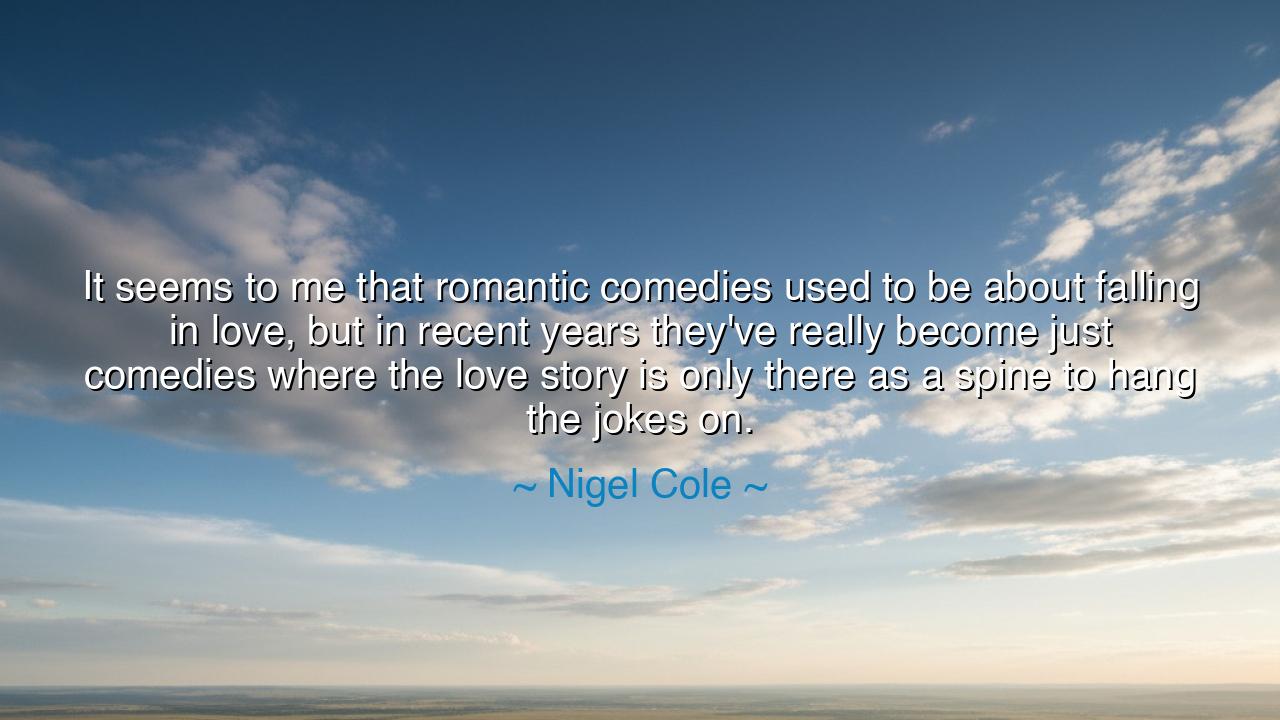
It seems to me that romantic comedies used to be about falling in
It seems to me that romantic comedies used to be about falling in love, but in recent years they've really become just comedies where the love story is only there as a spine to hang the jokes on.






In the insightful words of Nigel Cole, "It seems to me that romantic comedies used to be about falling in love, but in recent years they've really become just comedies where the love story is only there as a spine to hang the jokes on," we find a reflection on the changing nature of a genre that has, for generations, captured the hearts of audiences. Cole’s words speak to a shift from genuine emotional connection to superficial entertainment, where the central theme of love is often reduced to a mere backdrop for comedic antics. In the past, romantic comedies celebrated the transformative power of love, the ups and downs of emotional growth, and the moments of vulnerability that come with truly opening one's heart. But today, as Cole suggests, the focus has shifted toward humor and wit, with the romance often secondary to the punchlines and set pieces.
The ancients knew well the power of romance to transform, and Greek drama is a perfect example of how love was once central to the human experience. In plays such as Sophocles' Antigone or Euripides’ Medea, the stories were not only about the triumphs and tragedies of love, but about how those emotions drove characters to heroic and tragic acts. Even Aristophanes, in his comedies, explored relationships, sometimes with humor, but always with an undercurrent of truth about the emotional complexities of life and love. In these ancient stories, the love story was not merely a device for humor, but a driving force that shaped the very essence of the plot. Love was the core around which everything else revolved, creating moments of deep reflection, joy, and heartbreak. The romantic arc was central, not just for its entertainment value but for its ability to reflect human nature in all its complexity.
Similarly, the Romans—through figures like Virgil—embraced the transformative power of love. In the story of Dido and Aeneas, love is depicted as a force that can be both redemptive and destructive. Their love, like those of the Greek myths, is not an easy one, and it shapes their destinies in profound ways. The tragic end of their relationship serves as a reminder that love is a powerful emotion that can elevate but also ruin, and the consequences of love and passion are fate-altering. This contrasts with modern romantic comedies, where love often becomes an afterthought—a mere plot device rather than a central, life-altering experience.
In the 20th century, the romantic comedy evolved into a genre that continued to focus on the idealism of love, but the centrality of emotion often began to give way to lighter fare. Films like Casablanca, although brimming with humor and wit, still held love at their core, allowing the relationship between Rick and Ilsa to drive the emotional stakes of the film. Even in the comedic moments, the love story was treated with a deep respect, and audiences could feel the weight of the emotional connection between the characters. Over time, however, the love story became increasingly diluted, as Cole suggests, with films such as "The Wedding Planner" or "The Proposal" focusing more on situational comedy than the genuine emotional growth that love requires. The love story is often reduced to a set-up for the humor, rather than being the heart of the film.
In modern romantic comedies, the emotional stakes are frequently lower, and the focus is shifted from character development to situational humor. Take, for example, many of today’s popular rom-coms, where the plot revolves around quirky characters who face hilarious misunderstandings or awkward situations. The romance in these films is often secondary—treated as a convenient device to create tension before the inevitable resolution. The central emotional depth that once came from the transformative power of love has, in many cases, been replaced by lighthearted jokes and superficial charm. This shift is part of a larger cultural trend in which emotional connection and depth are often sacrificed in favor of instant gratification and comedic escapism.
The lesson in Cole's words—and in the stories of the ancients—is the importance of authenticity and depth in love. Romance, at its core, is about emotional truth, growth, and transformation. The shift in romantic comedies from genuine emotional connection to humorous diversion is a reflection of how we, as a society, sometimes prioritize instant pleasure over meaningful emotional experiences. True love, as depicted in the ancient myths and in timeless classics, is transformative and life-changing. It requires vulnerability, sacrifice, and above all, a willingness to confront the complexities of human nature. In that sense, the ancient view of romance speaks to the enduring truth that love is not just a plot device, but a central force in our lives.
In your own life, let romance not just be a lighthearted diversion, but a transformative force that shapes your choices, your growth, and your relationships. Embrace the emotional depth of love, understanding that it is through love—whether romantic, familial, or platonic—that we find our deepest connections with others. Recognize that the true essence of a love story is not just in the humor or the situation but in the emotional journey of the characters, the way they evolve and learn to understand themselves and each other. Be mindful of the tendency to reduce love to something superficial, and instead strive to cultivate relationships that are rich, complex, and deeply meaningful, just as the romantic poets and ancient dramatists once envisioned.






AAdministratorAdministrator
Welcome, honored guests. Please leave a comment, we will respond soon